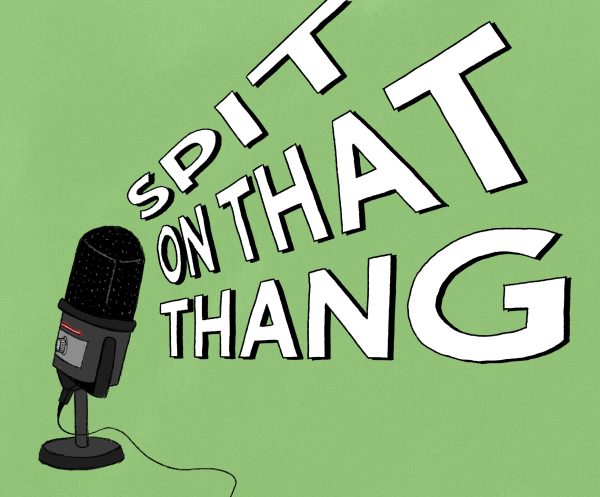
I consider myself an unserious man. I live my life with unclenched fists and a smile; I appreciate good humor and reciprocate. However, I will be the first to admit when I miss the comedic mark. A few days ago, I thought it would be funny if I listened to the new podcast “Talk Tuah.” My knowledge of the host, Haliey Welch, and her claim to fame was thin, restricted to brief introductions on social media that I dismissed as categorically unfunny. Still, I thought there would be something to laugh at in my attempt to sit through something that had no appeal. In my head, I rationalized that it would be campy enough to yield endearing qualities. Alas, after listening to nearly an hour of lobotomizing drivel, I feel idiotic.
Internet phenomena boggle the mind. Much like its breeding ground, the concept remains abstract, and yet the appeal of such examples is undeniably real. Why do some in-jokes become viral while others die out in a week?
Just this year, Welch became an internet sensation after her brief appearance on the vox pop channel “Tim & Dee TV” made rounds online. In the video, the host walks around Nashville asking sexually charged questions. Welch, accompanied by her friend, is asked the question: “What’s one move in bed that makes a man go crazy every time?” She responds immediately, saying, “Aw, [you’ve] got to give them that hawk tuah!” The nonsensical phrase she uses is an onomatopoetic description of spitting, apparently on a sexual partner’s penis.
A lot can be said about these types of man-on-the-street interviews, either about the interviewer’s fixation on dirty questions or their penchant for virality. To the latter point, the phrase “sex sells” has never rang so true. The clip went viral online, exploding in popularity due to reposts across multiple platforms. Over the summer, it evolved into a sort of shorthand remark for oral sex across all demographics. Welch capitalized on this newfound fame by hiring an agent, selling merchandise and appearing at a New York Mets game, of all places. Of course, like most who become quasi-famous in today’s age, she also created a podcast.
Despite the risqué nature of her virality, Welch’s quick attempt to cash in is harmless. In the information age, attention spans are shorter and so are the windows for fads. Why not, after all, make a concerted effort to supplant yourself in the spotlight, no matter how minor your claim to fame is? While I don’t find Welch or her off-the-cuff quip to be funny, if I had a similar path to wealth, I would take it.
However, Welch’s latest foray into the podcasting world ruined my day—nay, my week. The inaugural episode of “Talk Tuah” dropped on Sept. 10, featuring comedian Whitney Cummings. The podcast’s production quality is noticeably high, probably due to its affiliation with Betr, the sports betting company co-founded by Jake Paul. Yet the quality dips once you look past the numerous camera cuts and the lavish set.
At the beginning of the episode, Welch asserts that she is more than just the “hawk tuah girl,” a moniker bestowed upon her by those unfamiliar with anything but her internet origins. It makes sense that she would want to be something other than a one-trick pony; her media shelf life is dependent on her versatility. Yet she trots out the same tired concepts with the air of someone who’s trying desperately to produce another soundbite.
Welch tries to teach background character Chelsea how to do the “hawk tuah,” creating a moment that is beyond cringe-inducing. I mean, who is this podcast for? Is it a relationship advice podcast à la “Call Her Daddy”? Variety shows are fruitful endeavors on the airwaves, but Welch lacks the storytelling and simple humor to keep bits going on the show. Cummings certainly doesn’t do her any favors.
It seems that most comedic aspects of the show still hold onto Welch’s original viral comment. She talks about her reaction to the video’s release, farting on penises and the liquor she drank the night she became famous. These topics rely on the “hawk tuah” ethos, if you will, but the deceased nature of the meme leaves a stale taste. Later in the episode, Welch talks about her relationship with “Pookie,” a man who she has been on-and-off with. While the personal lives of podcasters are ripe for humorous content, her talks of him yield nothing of substance. She is just not interesting enough, let alone funny. It is always a horrible sign when a podcast starts off on such shaky footing, as the following episodes need to be captivating enough to warrant further listening. In the case of “Talk Tuah,” there’s nothing there. At the conclusion of the episode, I spent an hour watching old reruns of “The Simpsons,” purposefully trying to balance out the worthlessness I just took in.
While comedy is indeed subjective, I can’t wrap my head around the “hawk tuah” multiverse’s demographic. It’s not the 22-year-old Welch’s peers who like her content. Outside of the initial chuckles some people elicited when the original video came out, I haven’t heard any of my young adult friends reference the phenomenon with the same enthusiasm espoused on the podcast. In fact, the only times I’ve heard “hawk tuah” mentioned since June are those that mock the sequence itself.
It was never funny; “hawk tuah,” or its podcast, is not something to laugh with. Rather, it is something to laugh at.



Leave a Comment